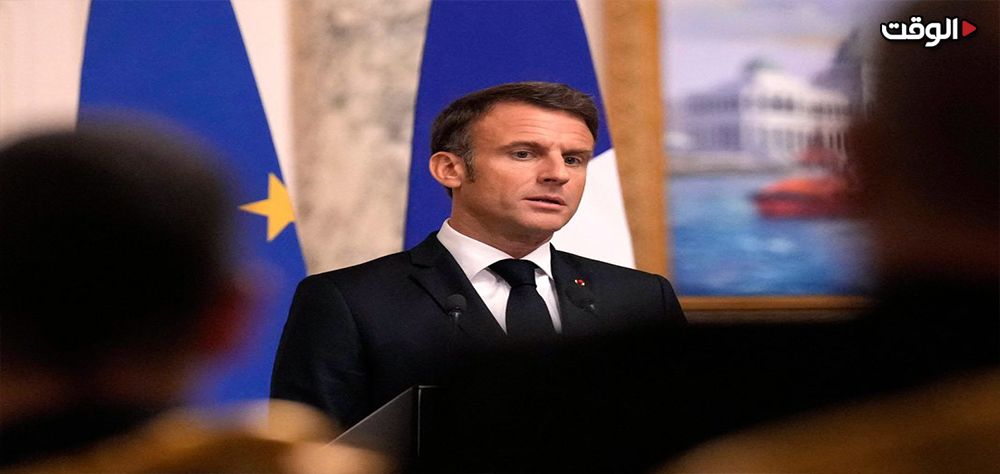Alwaght- The turbulent political conditions in France are making headlines these days. Media describe President Emmanuel Macron's dissolution of the parliament a political gamble that soon spiralled into a political crisis in the country and led to resignation of the prime minister.
Alwaght has talked to Hanif Ghafari, an expert of European affairs, asking him why this political crisis in France erupted and what would be the repercussions of Macron's recent measures on his position in the country's politics.
Mr Ghafari started with describing the leaders of parties as losers of the election, adding that recent elections marked a point that disclosed the defeat of Macron and opposition leader Marine Le Pen. Both Macron's party and National Rally party led by Le Pen lost the election. While the National Rally and Macron's party Renaissance imagined that they can increase their maneuvering power in the recent elections, they proved wrong. Why? Firstly, it is related to how French elections are held. After defeat in the European Parliament elections, Macron said that his legitimacy is questioned and sought to restore to the Elysse Palace its lost credibility in a general election.
Mr Ghafari continued that many of Macron's close friends consulted the president that this is a political gamble and it is difficult to win and his situation will worsen. But Macron, like the presidential election calculations that negative votes helped him retain the post, thought that all parties and groups including the Socialist Party and the Republican Party will support him and score a big victory for him. But this did not happen and the French president experienced his second loss in recent months. Secondly, it is related to the defeat of Le Pen and Jordan Bardella, the leaders of National Rally, in recent elections.
After the first round of elections, Le Pen wanted to take over the absolute majority of the parliament and form the government and impose the prime minister on the French president, something that would have been a prelude to the complete collapse of the government and Macron's exit from the political and executive equations. But what happened was the turnout decrease after election became a race between Macron and Le Pen, and this issue provided the ground for the supporters of the left-wing movement to take advantage of this situation and engage the social forces and gray voters to the equations and score a historic victory.
Mr Ghafari described the current situation in France as marking end of Macronism, adding that in the recent French developments, we faced several trends: First, end of Macronism. This is the most important happening in the present French politics. With the radical left ranking first and the National Rally ranking third, Macron has to define his political life in a limited space between the radical left and radical right parties.
In fact, Macron who once thought that he can shine as the economic and political leader of France now identifies himself to the EU as a man with last breathes and somehow playing in extra time in Elysse Palace. It can be said that the false self-confidence and dictatorial spirit of Macron who even did not accept advices from his fellow party members and made a political gamble have led to his political death, according to Ghafari.
In another part of his comments, Mr Ghafari mentioned a political transformation in Europe. He said that the second trend is change of European face. We no longer see England as a member of the EU and Euro Zone. After Brexit, England is practically off the European game. The common point of the leftist and rightist parties in France is that they do not accept the existence, nature, and structure of the EU and Euro Zone. This means that with the decline of the traditional parties in France and people's embracement of them, both of whom are different in terms of identity but at the same time share Euroeceptism, France can certainly not secure a role of leader of the EU for itself in next years. Even worse, we may have a Frexit like Brexit in the future. In Germany, the government of Chancellor Olaf Scholz that is comprised of Free Democrats and Greens with a 25-percent popularity cannot be a strong pillar and a support point in the EU. As a result, we are seeing a transformation in the EU that produces weak leaders and parties against the traditional structure of the EU.
Mr Ghafari described the power foundations of Europe as shaky, adding that another trend that showed itself in the recent French developments is the shakiness of the foundations and records of power in the EU. This is not a good news for the supporters of convergence in Europe. The third issue is that we are facing a Europe of 21st century that is interested in a U-turn to the 20th century. After the Treaty of Maastricht or the treaty of founding the EU, many did not think that one day nationalism and Euroeceptism will rise among the European citizens. And here it is the European leaders to blame. Currently, Europe is experiencing the highest level of crisis of trust in the traditional parties.
The expert concluded his remarks with a prediction of decline of the EU in the near future, saying that we can say that the European values like the Schengen Area, common currency, and even the security pacts that once were Europe's red lines have diminished. These factors show that in the near future, we will witness rise of a new Europe as the number of radical nationalist and revisionist members of parliament, including the radical left, is on the rise in Europe and it seems that this trend will keep unfolding in the future.



























